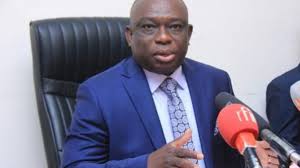Kouadio Konan Bertin, also known as KKB, an independent candidate for the October 31, 2020 presidential election, on Tuesday, acknowledged the victory in the first round of Alassane Ouattara.
This statement by Kouadio Konan Bertin delights the outgoing president and his supporters, giving also food for thought to those who were arguing that his candidacy was sponsored by Alassane Dramane Ouattara (ADO).
“Undoubtedly, Alassane Ouattara came out on top of the poll. That is why, in front of the Ivorian people, I want to congratulate him on his re-election,” KKB toldd at a press conference in Abidjan.
In order for Cote d’Ivoire not to sink into a post-electoral crisis, the independent candidate called for “the immediate convening of a national dialogue conference including all political forces, old and new.”
In his speech, Kouadio Konan Bertin insisted that the voter turnout of 53.90 percent constitutes “a scathing snub for all those who favor the gun (rather than) the ballot. (Thus) Cote d’Ivoire won the battle for peace. It’s essential.”
Paradoxically, KKB expressed doubts about the transparency of the electoral process: “The Independent Electoral Commission, whose composition I have repeatedly criticized, has just announced its results. It must be recognized that Cote d’Ivoire has not yet won the battle for transparency.”
He therefore considered that “this ballot must be the last to take place under these conditions, both in its conduct, its organization and its system for collecting the results.” According to Kouadio Konan Bertin, an election should no longer be held in Cote d’Ivoire “in a climate of suspicion and mistrust.”
Drawing lessons from his country’s recent past, Kouadio Konan Bertin claimed to have made “the very imperfect choice (of an election) over a deadly civil war.” Although he had noticed, during his campaign, that “the conditions for a transparent election were not met.”
KKB accused of colluding with Alassane Ouattara took it all: “When you love your country, between two evils, you have to choose the lesser. Between a civil war and imperfect results, we must accept imperfect results.”
In any case, he is convinced that “we can always correct the shortcomings of a poll, but if the country is torn apart, if houses are set ablaze, if the children of Cote d’Ivoire are killing each other, no one will be able to bring back lost lives.”
AP/ls/id/te/fss/abj/APA


